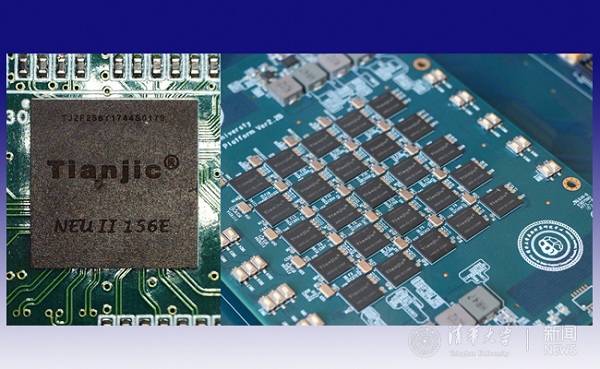
This is not a scene from a sci-fi movie, but a feat backed by an artificial intelligence (AI) chip developed by Chinese scientists.
The bicycle, installed with the AI chip dubbed 'Tianjic', performs self-driving, automatically responding to different situations.
It nimbly avoids obstacles in the way when following a human. Even when the human runs in a slightly S-curved path, the bicycle tracks exactly in the S-shape.
It is also able to recognize voice instructions, completing commands like "turn left," "go straight," and "speed up."
First hybrid AI chip makes the headlines

The research was published in the Nature journal as a cover story. (Photo: Nature Screenshot)
The Tianjic chip was developed by a group of researchers from China's Tsinghua University led by Professor Shi Luping. They installed about 40,000 neurons and 10 million synapses in the fingernail-size chip of 3.8x3.8 square millimeters.
It's the first-ever chip that integrates computer-science-oriented and neuroscience-oriented approaches, two general ways to develop artificial general intelligence (AGI).
Usually, the two approaches, both representing some of the patterns in which the human brain processes information, rely on different platforms, which are incompatible due to their fundamental differences in the formulations and coding schemes.
But a combination of the two is generally recognized as the best solution.
The research team proposed a multi-core architecture to accommodate the two approaches and developed the Tianjic chip on this basis, "can not only accommodate computer-science-based machine-learning algorithms, but also easily implement brain-inspired circuits and several coding schemes," read the research paper abstract.
The second-generation Tianjic was developed from the 2015 version. It features high-speed, high-performance and low-power consumption.
Compared with the current advanced TrueNorth chip from IBM, Tianjic has more comprehensive functions, greater flexibility and better scalability. Its density is increased by 20 percent, speed by at least 10 times, and bandwidth by at least 100 times.

The Tianjic chip. (Photo: tsinghua.edu.cn)
Functions of the unmanned bicycle system like voice recognition, autonomous decision-making, and visual tracking use the brain-inspired model, while the target detection, motion control, and obstacle avoidance use the machine-learning algorithm model, researcher Deng Lei told Thepaper.cn.
The paper entitled "Towards artificial general intelligence with hybrid Tianjic chip architecture" was published in the Nature journal as a cover story on Wednesday.
The chip can be applied in automatic pilot systems and intelligent robots, said Deng.
"Our study is expected to stimulate AGI development by paving the way to more generalized hardware platforms," the authors said.
What's AGI?

The unmanned bicycle follows the voice command to turn left. (Photo: Nature Gif)
AGI refers to the machine intelligence that can understand or learn any intellectual task that humans can accomplish. Some call it as "strong AI."
It's a vision that hasn't yet been realized.
Some AI scholars believe the concept of AGI is not serious and is basically impossible to achieve in practice. Others are bullish about its development, saying it has the potential to shape the trajectory of humanity.
Though a difficult research subject, Professor Shi said at a press conference that he believes that AGI will happen, and is an inevitable trend from the perspective of future development.
China's efforts in AI development
China continues striving to develop AI.
In January, a report released by World Intellectual Property Organization (WIPO) under the United Nations, showed that China and U.S. are the two countries that lead the global competition to dominate AI.
The report, entitled "WIPO Technology Trends 2019: Artificial Intelligence," sorted out globally disclosed AI patents by 2016, the latest year for which data is available due to patent confidentiality.
According to the report, three of the four research institutions in the world's top 30 patent applicants for AI are from China. Seventeen of the top 20 research institutions with the highest number of AI patent applications are from China, and of the top 20 AI-related scientific publications, 10 are from China, indicating China's growing importance in the field of AI.
The country unveiled a national AI development plan in 2017 in which it aims to build an AI technologically world-leading domestic industry by 2030.
The value of the country's core AI industries is expected to exceed 150 billion yuan (21.7 billion U.S. dollars) by 2020 and 400 billion yuan (57.9 billion U.S. dollars) by 2025.
China is just "doing far more than talking about AI" as the U.S. website MarketWatch said.


